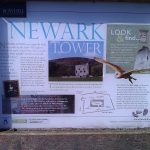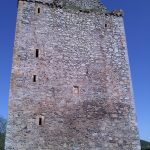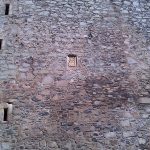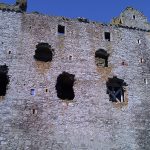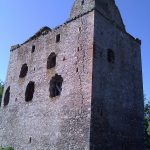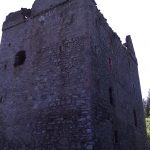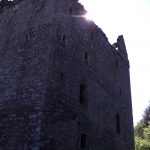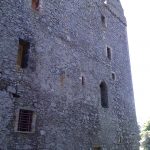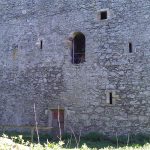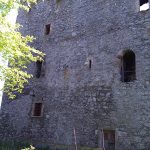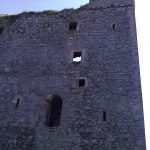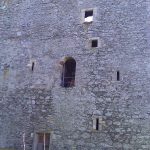THE OUTLAW MURRAY
THE SANG of THE OUTLAW MURRAY.
Republished from:
By Sir Walter Scott of Abbotsford, Bart.
Robert Cadell, Edinburgh: Houlston & Stoneman, London. MDCCCXLIX.
Page 369.
This ballad appears to have been composed about the reign of James V. It commemorates a transaction, supposed to have taken place betwixt a Scottish monarch, and an ancestor of the ancient family of Murray of Philiphaugh, in Selkirkshire. The Editor is unable to ascertain the historical foundation of the tale; nor is it probable that any light can be thrown upon the subject, without an accurate examination of the family charter-chest. It is certain, that, during the civil wars betwixt Bruce and Baliol, the family of Philiphaugh existed, and was powerful; for their ancestor, Archibald de Moravia, subscribes the oath of fealty to Edward I., A.D. 1296. It is, therefore, not unlikely, that, residing in a wild and frontier country, they may have, at one period or other, during these commotions, refused allegiance to the feeble monarch of the day, and thus extorted from him some grant of territory or jurisdiction. It is also certain, that, by a charter from James IV., dated November 30, 1509, John Murray of Philiphaugh is vested with the dignity of heritable Sheriff of Ettrick Forest, an office held by his descendants till the final abolition of such jurisdictions by 28th Geo. II., cap. 23. But it seems difficult to believe, that the circumstances mentioned in the ballad could occur under the reign of so vigorous a monarch as James IV. It is true, that the Dramatis Personae introduced seem to refer to the end of the fifteenth, or beginning of the sixteenth century; but from this it can only be argued, that the author himself lived soon after that period. It may, therefore, be supposed, (unless farther evidence can be produced, tending to invalidate the conclusion,) that the bard, willing to pay his court to the family, has connected his grant of the sheriffship by James IV., with some former dispute betwixt the Murrays of Philiphaugh and their sovereign, occurring either while they were engaged upon the side of Baliol, or in the subsequent reigns of David II. and Robert II. and III., when the English possessed great part of the Scottish frontier, and the rest was in so lawless a state as hardly to acknowledge any superior.
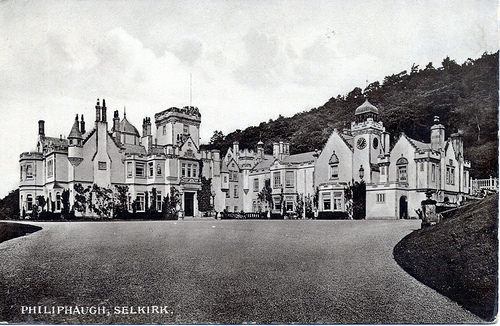
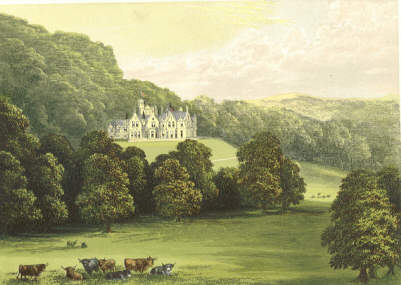
At the same time, this reasoning is not absolutely conclusive. James IV. had particular reasons for desiring that Ettrick Forest, which actually formed part of the jointure lands of Margaret, his Queen, should be kept in a state of tranquillity. —RYMER, vol. xiii. p. 66. In order to accomplish this object, it was natural for him, according to the policy of his predecessors, to invest one great family with the power of keeping order among the rest. It is even probable, that the Philiphangh family may have had claims upon part of the lordship of Ettrick Forest, which lay intermingled with their own extensive possessions; and, in the course of arranging, not, indeed, the feudal superiority, but the property of these lands, a dispute may have arisen, of sufficient importance to be the groundwork of a ballad.
It is farther probable, that the Murrays, like other Border clans, were in a very lawless state, and held their lands merely by occupancy, without any feudal right. Indeed the lands of the various proprietors in Ettrick Forest, (being a royal demesne,) were held by the possessors, not in property, but as the kindly tenants, or rentallers, of the crown; and it is only about 150 years since they obtained charters, striking the feu-duty of each proprietor at the rate of the quit rent which he formerly paid. This state of possession naturally led to a confusion of rights and claims. The Kings of Scotland were often reduced to the humiliating necessity of compromising such matters with their rebellious subjects, and James himself even entered into a sort of league with Johnnie Faa, the king of the gipsies. Perhaps, therefore, the tradition, handed down in this song, may have had more foundation than it would at present be proper positively to assert.
The merit of this beautiful old tale, it is thought, will be fully acknowledged. It has been, for ages, a popular song in Selkirkshire. The scene is, by the common people, supposed to have been the Castle of Newark upon Yarrow. This is highly improbable, because Newark was always a royal fortress. Indeed, the late excellent antiquarian, Mr Plummer, Sheriff-depute of Selkirkshire, has assured the Editor, that he remembered the insignia of the unicorns, &c., so often mentioned in the ballad, in existence upon the old Tower of Hangingshaw, the seat of the Philiphaugh family; although, upon first perusing a copy of the ballad, he was inclined to subscribe to the popular opinion. The Tower of Hangingshaw has been demolished for many years. It stood in a romantic and solitary situation, on the classical banks of the Yarrow. When the mountains around Hangingshaw were covered with the wild copse which constituted a Scottish forest, a more secure stronghold for a0n outlawed baron can scarcely be imagined.
Pictures of Newark Castle (Royal Hunting Lodge in the Selkirkshire Forest):
The tradition of Ettrick Forest bears, that the outlaw was a man of prodigious strength, possessing a baton or club, with which he laid lee (i. e. waste) the country for many miles round; and that he was at length slain by Buccleuch, or some of his clan, at a little mount, covered with fir-trees, adjoining to Newark Castle, and said to have been a part of the garden.1 A varying tradition bears the place of his death to have been near to the house of the Duke of Buccleuch’s gamekeeper, beneath the castle; and that the fatal arrow was shot by Scott of Haining, from the ruins of a cottage on the opposite side of Yarrow. There were extant, within these twenty years, some verses of a song on his death. The feud betwixt the Outlaw and the Scots, may serve to explain the asperity with which the chieftain of that clan is handled in the ballad.
1 [The hollow under this mount is called by the country people, “slain-man’s lee;” and a number of human bones were found there a few years ago in making a drain. 1830. — Ed.]
In publishing the following ballad, the copy principally resorted to is one, apparently of considerable antiquity, which was found among the papers of the late Mrs Cockburn of Edinburgh, a lady whose memory will be long honoured by all who knew her.2 Another copy, much more imperfect, is to be found in Glenriddel’s MSS. The names are in this last miserably mangled, as is always the case when ballads are taken down from the recitation of persons living at a distance from the scenes in which they are laid. Mr Plummer also gave the Editor a few additional verses, not contained in either copy, which are thrown into what seemed their proper place. There is yet another copy in Mr Herd’s MSS., which has been occasionally made use of. Two verses are restored in the present edition, from the recitation of Mr Mungo Park, whose toils during his patient and intrepid travels in Africa, have not eradicated from his recollection the legendary lore of his native country.3
2 [Mrs Cockburn of Ormistoun, the authoress of the “Flowers of the Forest.” — Ed.]
3 [The cottage in which Mungo Park was born stands nearly opposite to Newark Castle, on the Yarrow. — Ed.]
The arms of the Philiphaugh family are said by tradition to allude to their outlawed state. They are, indeed, those of a huntsman, and are blazoned thus: —
Argent, a hunting-horn sable, stringed and garnished gules, on a chief azure, three stars of the first. Crest, a Demi-Forester, winding his horn, proper. Motto, Hinc usque superna venabor.
The Pedigrees and Heraldry of the Murrays: The heraldry of the Murrays
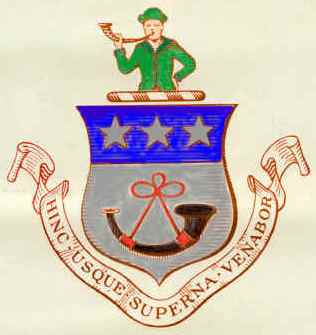
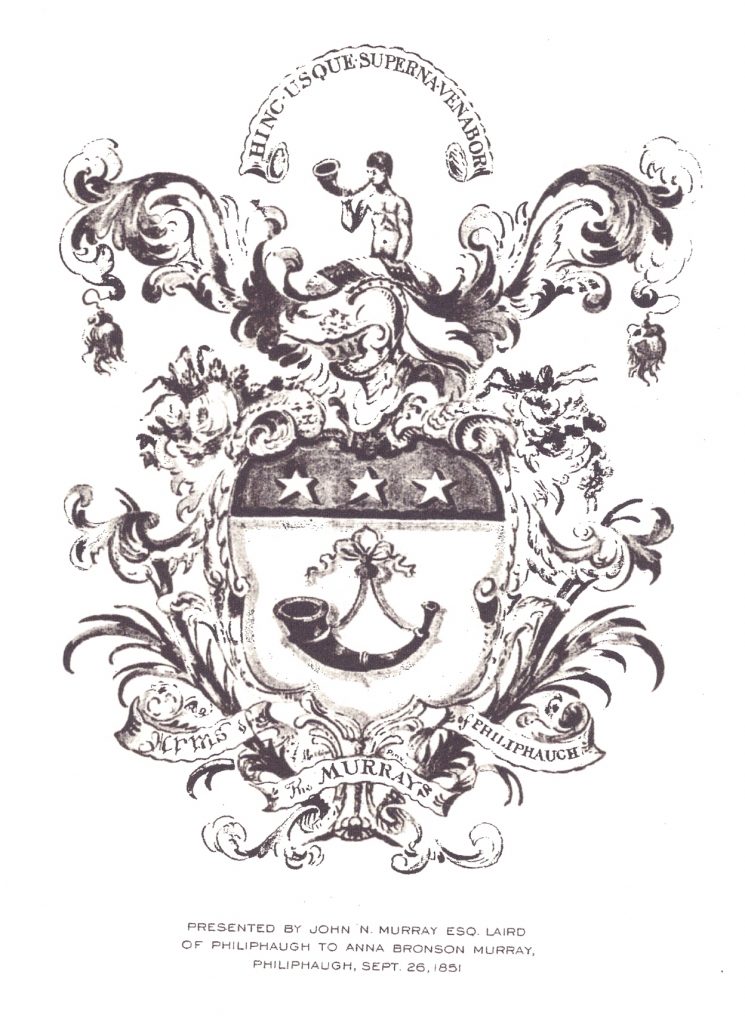
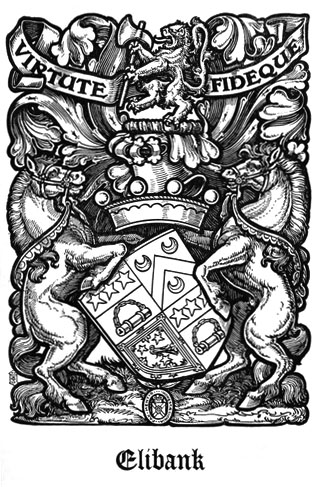
THE SANG of THE OUTLAW MURRAY
By Sir Walter Scott of Abbotsford, Bart.
* This is, in most copies, the earl hight Hamilton, which must be a mistake of the reciters, as the family did not enjoy that title till 1503.
“I redd ye, send yon braw Outlaw till, And see gif your man cum will he:Desyre him cum and be your man, And hald of you yon Foreste frie. “Gif he refuses to do that, We’ll conquess baith his landis and he !Or else, we’ll throw his castell down, And make a widowe o’ his gaye ladye.”— The King then call’d a gentleman, James Boyd (the Earle of Arran his brother was he;*)When James he cam before the King, He knelit befor him on his kné.* Thomas Boyd, Earl of Arran, was forfeited, with his father and uncle, in 1469, for an attempt on the person of James III. He had a son, James, who was restored, and in favour with James IV. about 1482. If this be the person here meant, we should read, “The Earl of Arran his son was he.” Glenriddel’s copy reads, “a Highland laird I’m sure was he.” Reciters sometimes call the messenger the Laird of Skene.
“Wellcum, James Boyd!” said our nobil King, “A message ye maun gang for me;Ye maun hye to Ettricke Foreste, To yon Outlaw, where bydeth he: “Ask him of whom he haldis his landis. Or man, wha may his master be,And desyre him cum, and be my man And hald of me yon Foreste frie. “To Edinburgh to cum and gang, His safe warrant I sail gie;And gif he refuses to do that, We’ll conquess baith his landis and he. “Thou mayst vow I’ll cast his castell down, And mak a widowe o’ his gaye ladye;I’ll hang his merryemen, payr by payr, In ony frith where I may them see.”— James Boyd tuik his leave o’ the nobil King, To Ettricke Foreste feir cam he;Down Birkendale Brae when that he cam, He saw the feir Foreste wi’ his ee.** Birkendale Brae, now commonly called Birkendailly, is a steep descent on the south side of Minch-moor, which separates Tweeddale from Ettrick Forest; and from the top of which we have the first view of the woods of Hangingshaw, the Castle of Newark, and the romantic dale of Yarrow.
Baith dae and rae, and harte and hinde, And of a’ wilde bestis great plentie;He heard the blows that bauldlv ring, And arrows whidderan’ hym near bi. Of that feir castell he got a sight; The like he neir saw wi’ his ee!On the fore front o’ that castell feir, Twa unicorns were gaye to see;The picture of a knight, and ladye bright, And the grene hollin abune their brie. Thereat he spyed five hundred men, Shuting with bows on Newark Lee;They were a’ in ae livery clad, O’ the Lincome grene sae gaye to see. His men were a’ clad in the grene, The knight was armed capapie,With a bended bow, on a milk-white steed; And I wot they rank’d right bonnilie. Thereby Boyd kend he was master man, And served him in his ain degré.“God mot thee save, brave Outlaw Murray! Thy ladye, and all thy chyvalrie! “—“Marry, thou’s wellcum, gentleman. Some king’s messenger thou seemis to be.”— “The King of Scotlonde sent me here, And, gude Outlaw, I am sent to thee;I wad wot of whom ye hald your landis, Or man, wha may thy master be?”— “Thir landis are mine!” the Outlaw said; “I ken nae King in Christentie;Frae Soudron [Southron, or English] I this Foreste wan, When the King nor his knightis were not to see.”— “He desyres you’l cum to Edinburgh, And hauld of him this Foreste fre;And, gif ye refuse to do this, He’ll conquess baith thy landis and thee.He hath vow’d to cast thy castell down, And mak a widowe o’ thy gaye ladye; “He’ll hang thy merryemen, payr by payr, In ony frith where he may them finde.”—“Ay, by my troth!” the Outlaw said, “Than wauld I thinke me far behinde. “Ere the King my feir countrie get, This land that’s nativest to me!Mony o’ his nobilis sall be cauld, Their ladyes sall be right wearie.”— Then spak his ladye, feir of face. She seyd, “Without consent of me,That an Outlaw suld come befor a King; I am right rad [Afraid] of treasonrie.Bid him be gude to his lordis at hame, For Edinburgh my lord sall nevir see.”— James Boyd tuik his leave o’ the Outlaw kene, To Edinburgh boun is he;When James he cam before the King, He knelit lowlie on his kné. “Welcum, James Boyd!” seyd our nobil King; “What foreste is Ettricke Foreste frie?”—“Ettricke Foreste is the feirest foreste That evir man saw wi’ his ee. “There’s the dae, the rae, the hart, the hynde, And of a’ wild bestis grete plentie;There’s a pretty castell of lyme and stane, O! gif it standis not pleasauntlie! “There’s in the fore front o’ that castell, Twa unicorns, sae bra’ to see;There’s the picture of a knight, and a ladye bright, Wi’ the grene hollin abune their brie. “There the Outlaw keepis five hundred men, He keepis a royalle cumpanie!His merryemen in ae livery clad, O’ the Lincome grene sae gaye to see:He and his ladye in purple clad;O! gin they live not royallie! “He says, yon Foreste is his awin; He wan it frae the Southronie;Sae as he wan it, sae will he keep it, Contrair all kingis in Christentie.”— “Gar warn me Perthshire, and Angus baith; Fife up and downe, and Louthians three,And graith my horse!” said our nobil King, “For to Ettricke Forest hie will I me.”— Then word is gane the Outlaw till, In Ettricke Forest, where dwelleth he,That the King was cuming to his cuntrie, To conquess baith his landis and he. “I mak a vow,” the Outlaw said, “I mak a vow, and that trulie,Were there but three men to tak my pairt, Yon King’s cuming full deir suld be!”— Then messengers he called forth, And bade them hie them speedilye—“Ane of ye gae to Halliday, The Laird of the Corehead* is he.* This is a place at the head of Moffat-water, possessed of old by the family of Halliday.
“He certain is my sister’s son; Bid him cum quick and succour me!The King cums on for Ettricke Foreste, And landless men we a’ will be.”— “What news? What news?” said Halliday “Man, frae thy master unto me? “—“Not as ye wad; seeking your aide; The King’s his mortal enemie.”— “Ay, by my troth!” said Halliday, “Even for that it repenteth me;For gif he lose feir Ettricke Foreste, He’ll tak feir Moffatdale frae me. “I’ll meet him wi’ five hundred men, And surely mair, if mae may be;And before he gets the Foreste feir, We a’ will die on Newark Lee! “— The Outlaw call’d a messenger, And bid him hie him speedilye,To Andrew Murray of Cockpool*— “That man’s a deir cousin to me;Desyre him cum, and make me aide, With a’ the power that he may be.”—* This family were ancestors of the Murrays, Earls of Annandale; but the name of the representative, in the time of James IV., was William, not Andrew. Glenriddel’s MS. reads, “the country-keeper.”
“It stands me hard,” Andrew Murray said, “Judge gif it stand na hard wi’ me;To enter against a King wi’ crown, And set my landis in jeopardie!Yet, if I cum not on the day, Surely at night he sall me see.”— To Sir James Murray of Traquair,* A message came right speedilye—“What news? What news?” James Murray said, “Man, frae thy master unto me?”—* Before the Barony of Traqualr became the property of the Stewarts, it belonged to a family of Murrays, afterwards Murrays of Black-barony, and ancestors of Lord Elibank. The old castle was situated on the Tweed. The lands of Traqualr were forfeited by Willielmus de Moravia, previous to 1464; for, in that year, a charter, proceeding upon his forfeiture, was granted by the crown to “Willielmo Douglas de Cluny.” Sir James was, perhaps, the heir of William Murray. It would farther seem, that the grant in 1464 was not made effectual by Douglas; for another charter from the crown, dated the 3d February, 1478, conveys the estate of Traquair to James Stewart, Earl of Buchan, son of the Black Knight of Lorne, and maternal uncle to James III., from whom is descended the present Earl of Traquair. The first royal grant not being followed by possession, it is very possible that the Murrays may have continued to occupy Traquair long after the date of that charter. Hence, Sir James might have reason to say, as in the ballad, “The King has gifted my lands lang syne.”
“What neids I tell? for weel ye ken The King’s his mortal enemie;And now he is cuming to Ettricke Foreste, And landless men ye a’ will be.”— “And, by my trothe,” James Murray said, “Wi’ that Outlaw will I live and die;The King has gifted my landis lang syne— It cannot be nae warse wi’ me.” The King was cuming thro’ Caddon Ford,* And full five thousand men was he;They saw the derke Foreste them before, They thought it awsome for to see.* A ford on the Tweed, at the mouth of the Caddon Burn, near Yair.
Then spak the lord, hight Hamilton, And to the nobil King said he,“My sovereign liege, sum council tak, First at your nobilis, syne at me. “Desyre him mete thee at Permanscore, And bring four in his cumpanie;Five Erles sail gang yoursell befor, Gude cause that you suld honour’d be. “And, gif he refuses to do that, We’ll conquess baith his landis and he;There sall nevir a Murray, after him, Hald land in Ettricke Foreste free.”— Then spak the kene Laird of Buckscleuth, A stalworthe man, and sterne was he—“For a King to gang an Outlaw till, Is beneath his state and his dignitie. “The man that wons yon Foreste intill, He lives by reif and felonie!Wherefore, brayd on, my sovereign liege Wi’ fire and sword we’ll follow theeOr, gif your courtrie lords fa’ back, Our Borderers sall the onset gie.”— Then out and spak the nobil King And round him cast a wilie ee—“Now, had thy tongue, Sir Walter Scott, Nor speak of reif nor felonie:For, had every honest man his awin kye, A right puir clan thy name wad be!”— The King then call’d a gentleman, Royal banner-bearer there was he;James Hoppringle of Torsonse, by name;* He cam and knelit upon his kné.* The honourable name of Pringle, or Hoppringle, is of great antiquity in Roxburghshire and Selkirkshire. The old Tower of Torsonse is situated on the banks of the Gala. I believe the Pringles of Torsonse are now represented by Sir John Pringle of Stitchell. There are three other ancient and distinguished families of this name; those of Whitebank, Clifton, and Torwoodlee.
NOTE (by James Pringle, the website owner)
Hoppringle – This is the only version of the ballad that i have found, that correctly spells the name Hoppringle! Other versions incorrectly hyphenate our name, or have Hop as a prefix, believing it to be from the Welsh prefix Ap, it is not!
Royal banner-bearer – Today the Earl of Dundee is recognized as the Bearer of the Royal Banner in Scotland, and the Earl of Lauderdale is recognized as the Bearer of the National Flag of Scotland. They had a dispute over the role of Royal banner-bearer in 1902, and the Earl of Dundee won. The Earl of Lauderdale was compensated by the Lord Lyon with the new office of National flag bearer in 1952. I believe that the Pringle’s have been overlooked again! “Wellcum, James Pringle of Torsonse! A message ye maun gang for me:Ye maun gae to yon Outlaw Murray, Surely where bauldly bideth he “Bid him mete me at Permanscore, And bring four in his cumpanie;Five erles sall cum wi’ mysell, Gude reason I suld honour’d be, “And gif he refuses to do that, Bid him luke for nae good o’ me!There sall nevir a Murray, after him, Have land in Ettricke Foreste free.” James cam before the Outlaw kene, And served him in his ain degré—“Welcum, James Pringle of Torsonse! What message frae the King to me?”— “He bids ye meet him at Permanscore,* And bring four in your cumpany;Five erles sall gang himsell befor, Nae mair in number will he be.* Permanscore is a very remarkable hollow on the top of a high ridge of hills, dividing the vales of Tweed and Yarrow, a little to the eastward of Minch-moor. It is the outermost point of the lands of Broadmeadows. The Glenriddel MS., which, in this instance, is extremely inaccurate as to names, calls the place of rendezvous,
“The Poor Man’s House,” and hints that the Outlaw was surprised by the treachery of the King:—
“Then he was aware of the King’s coming. With hundreds three in company,‘I wot the muckle deel * * * * * He learned Kingis to lie!For to fetch me here frae amang my men, Here, like a dog for to die.’ “I believe the reader will think with me, that the catastrophe is better, as now printed from Mrs Cockburn’s copy. The deceit, supposed to be practised on the Outlaw, is unworthy of the military monarch, as he is painted in the ballad; especially if we admit him to be King James IV.
“And gif you refuse to do that, (I freely here upgive wi’ thee,)He’ll cast yon bonny castle down, And make a widowe o’ that gay ladye. “He’ll loose yon bluidhound Borderers, Wi’ fire and sword to follow thee;There will nevir a Murray, after thysell, Have land in Ettrick Foreste free.”— “It stands me hard,” the Outlaw said; “Judge gif it stands na hard wi’ me,Wha reck not losing of mysell. But a’ my offspring after me. “My merryemen’s lives, my widowe’s teirs— There lies the pang that pinches me;“When I am straught in bluidie eard, Yon castell will be right dreirie. “Auld Halliday, young Halliday, Ye sail be twa to gang wi’ me;Andrew Murray, and Sir James Murray, We’ll be nae mae in cumpanie.”— When that they cam before the King, They fell before him on their kné—“Grant mercie, mercie, nobil King! E’en for his sake that dyed on tree.”— “Sicken like mercie sall ye have; On gallows ye sall hangit be! “—“Over God’s forbode,” quoth the Outlaw then, I hope your grace will bettir be!Else, ere you come to Edinburgh port, I trow thin guarded sall ye be: “Thir landis of Ettricke Foreste fair, I wan them from the enemie;Like as I wan them, sae will I keep them, Contrair a’ kingis in Christentie.”— All the nobills the King about, Said pitie it were to see him dee—“Yet grant me mercie, sovereign prince, Extend your favour unto me! “I’ll give thee the keys of my castell, Wi’ the blessing o’ my gay ladye,Gin thou’lt make me sheriffe of this Foreste, And a’ my offspring after me.”— “Wilt thou give me the keys of thy castell, Wi’ the blessing of thy gaye ladye?I’se make thee sheriffe of Ettricke Foreste, Surely while upward grows the tree;If you be not traitour to the King, Forfaulted sall thou nevir be.”— “But, Prince, what sall cum o’ my men? When I gae back, traitour they’ll ca’ me.I had rather lose my life and land, Ere my merryemen rebuked me.”— “Will your merryemen amend their lives? And a’ their pardons I grant thee—Now, name thy landis where’er they lie, And here I RENDER them to thee.”— “Fair Philiphaugh is mine by right, And Lewinshope still mine shall be;Newark, Foulshiells, and Tinnies baith, My bow and arrow purchased me. “And I have native steads to me, The Newark Lee and Hanginshaw;*I have mony steads in the Forest schwa, But them by name I dinna knaw.”* In this and the following verse, the ceremony of feudal investiture is supposed to be gone through, by the Outlaw resigning his possessions into the hands of the king, and receiving them back, to be held of him as superior. The lands of Philiphaugh are still possessed by the Outlaw’s representative. Hangingshaw and Lewinshope were sold of late years. Newark, Foulshiels, and Tinnies, have long belonged to the family of Buccleuch.
The keys of the castell he gave the King, Wi’ the blessing o’ his feir ladye;He was made sheriffe of Ettricke Foreste, Surely while upward grows the tree;And if he was na traitour to the King, Forfaulted he suld never be. Wha ever heard, in ony times, Sicken an outlaw in his degré,Sic favour get befor a King, As did the OUTLAW MURRAY of the Foreste free?The Ballad of the Outlaw Murray
Modern version


